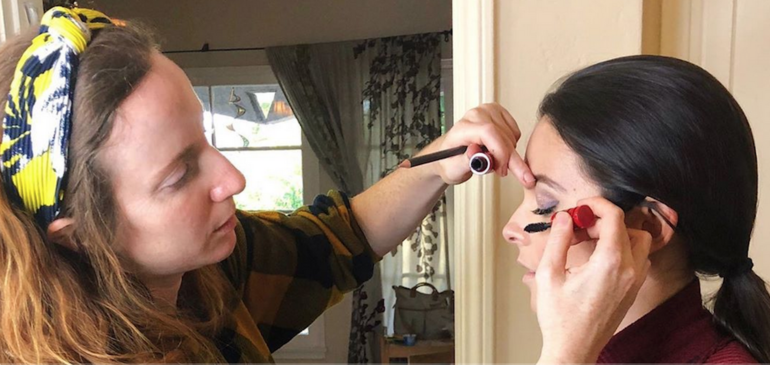
She Grew Up Chabad And Became A Shomer Shabbos Hollywood Makeup Artist
Aura Schwartz is not the typical Hollywood make-up artist. Growing up Lubavitch between the bright lights of L.A. and Chabad schools, Schwartz has always bridged both worlds. Since her parents were the active Chabad Rabbi and Rebbetzin in town, she recalls, “We had everybody come through our house,” from professional producers to directors to musicians. Being one of twelve siblings, mostly composed of older, chic sisters who often styled her, Schwartz notes, “I found beauty as a young girl… I think it’s just ingrained.” The cliché image of a little girl prancing around the house in mommy’s high heels, pearls and lipstick (colored way out of the lines) was not a mere movie scene for her but a basic reality, influenced to walk in her sisters’ fashionable footsteps.
Post high school, she did a gap year in Israel and then moved to New York, on the prowl for a job within the competitive beauty industry. Luckily, a well-connected, fellow make-up artist introduced her to the high-end fashion/beauty world and encouraged her to start off by assisting prominent artists and then building up from there. Schwartz believes make-up to be “something that can be taught but it’s also innate… and for me makeup is not only about the lines, it’s also about the texture.” Though this is an unconventional trade for an Orthodox Jewish woman to succeed in, it had never been dismissed by her parents because it was mutually known that she had an inner “Jewish confidence,” despite the job having a competitive nature, and even being “kind of dark and dirty sometimes.” Her first gig was in Manhattan at the Henri Bendel store. After a year of work there, she made her way back to L.A. to start cosmetology school while assisting Hollywood professionals like Paul Starr with major magazine shoots. Later in her career, she had taken A-list actors like Jennifer Garner and Kate Hudson as clients of her own.
This benefitted her name, but still, there are no guaranteed tickets into the beauty world. This was all the more so for being Shabbos-observant. “There’s a ton of work I had to turn down… it was very disappointing and upsetting that I would miss these big clients that [could] move my career forward and get me bigger and better jobs.” It wasn’t an easy battle. Schwartz remembers having to filter out the negative reactions from her fellow make-up and hair stylists in school, declaring it to be an impossible pursuit due to her unshakable Shabbos observance. The first time she was able to prove this theory wrong was when Starr had given her the okay to leave whenever she needed on a Friday afternoon, during a huge magazine shoot, in time for Shabbos. For her this was “crazy, because most assistants are the last ones there,” and he was super understanding. Upon receiving her cosmetology license in 2005, she moved back to New York to focus on fashion and spread her wings further. She did so when working for various agencies and make-up artists on New York Fashion Week. Because it’s a week-long event, Shabbos didn’t arise as an issue; they simply booked her for weekday shows. Yet, there were other times when Shabbos was a problem for some other bosses.
Schwartz found solace in always being connected to her roots, “You really need to create your own relationship with G-d, with your religion and all of that.” This relationship is what kept her pushing, advancing through the industry while maintaining Orthodox values and standards. She was fixed on the type of future self and family she wanted, stating, “If I would start working Shabbos, it would be very hard to stop… I understood the power of keeping that sacred.” Alongside her commitment to Judaism, Schwartz and her husband are warm and welcoming to their non-Jewish co-workers and Jewish friends on other religious levels, inviting them all to come through their home just as was done in her parents’ house. Now, she teaches this same message to her own kids when hosting Friday night meals with people who are different than they are. “Every family has their own rules, just because this person doesn’t wear a yarmulke or they drive on Shabbos doesn’t make them a not as good Jew. It just makes them a different Jew. But that’s not what we do.”
The natural pressures of this field have given Schwartz wisdom to offer, and offers this advice to keep in mind. “Find anyone who knows anyone, that would be your first step. [This] business is really about who you know… be persistent, it is really key.” You need to consistently email and remind those in power who you are and what you can contribute (and do so for free if you’re just starting out.) She encourages would-be artists to think of themselves as being an asset to their team, as being helpful and not a bother nor a burden. “I see what you need before you need it. That’s what makes a great assistant” Schwartz expresses, and that is what ultimately got her climbing the rungs of the industry till today.
Schwartz can be reached via email at aura.beauty@gmail.com for inquiries.
If you found this content meaningful and want to help further our mission through our Keter, Makom, and Tikun branches, please consider becoming a Change Maker today.








1 comment
Sort by
I loved this! The writing and content is absolutely super!
What an inspiration!